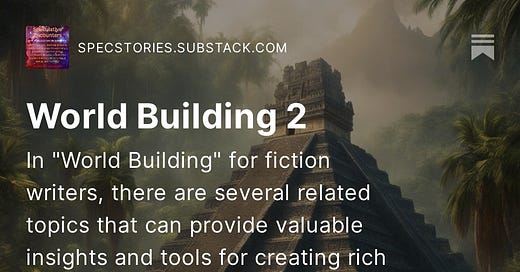World Building 2
In "World Building" for fiction writers, there are several related topics that can provide valuable insights and tools for creating rich and immersive fictional worlds.
In the realm of "World Building" for fiction writers, there are several related but distinct subjects that can be explored. These topics can provide valuable insights and tools for creating rich and immersive fictional worlds. Let's examine a few of these areas
:
Cultural Anthropology and Sociology:
Description: This involves understanding how societies function, including their customs, beliefs, social structures, and interactions. It helps in creating authentic and diverse cultures in your fictional world.
Example: If you're building a fantasy world, you might look into the social hierarchies, rituals, and taboos of different races or species.
Geography and Ecology:
Description: This focuses on the physical aspects of your world, like landscapes, climates, ecosystems, and how they influence civilizations and wildlife.
Example: If your story takes place in a desert region, you'd want to consider how the harsh environment affects the inhabitants' way of life and survival strategies.
Technology and Magic Systems:
Description: This involves determining the level of technological advancement or the existence and rules of magic in your world. It affects how characters solve problems and interact with their environment.
Example: In a science fiction setting, you'd need to define the capabilities and limitations of futuristic technology. In a fantasy world, you'd establish the principles governing magic.
History and Lore:
Description: This covers the past events, legends, and myths of your world. Understanding its history can add depth and context to the current state of affairs.
Example: If there's an ancient war that shaped the political landscape, characters might still be dealing with the aftermath or reaping the benefits of victory.
Economics and Trade:
Description: This involves how goods, services, and resources are produced, distributed, and consumed in your world. It shapes the economic systems and power dynamics.
Example: If there's a scarcity of a particular resource, like a rare gem or a magical substance, it could lead to conflicts or quests centered around obtaining it.
Religions and Belief Systems:
Description: This explores the spiritual and religious beliefs of the inhabitants of your world. It can influence their values, morals, and motivations.
Example: Different cultures might have contrasting beliefs about the origins of their world or the purpose of life, which can lead to conflicts or alliances.
Politics and Governance:
Description: This encompasses the systems of rule, power structures, and political ideologies present in your world. It dictates how decisions are made and who holds authority.
Example: If there's a monarchy, a council of elders, or a democratic system, it will affect how characters navigate politics and exert influence.
Language and Communication:
Description: This involves creating unique languages, dialects, or forms of communication for different groups in your world. It can add authenticity and flavor to your setting.
Example: Elves might have an elegant and melodic language, while Dwarves might have a guttural and robust one.
Remember, while these subjects are related to world building, they each provide a distinct lens through which you can flesh out your fictional universe. Mastering these aspects can lead to a more vibrant and believable world for your readers to explore.
<The following articles expand on the eight topics above, and more.>
Keep reading with a 7-day free trial
Subscribe to StoryAngles to keep reading this post and get 7 days of free access to the full post archives.





